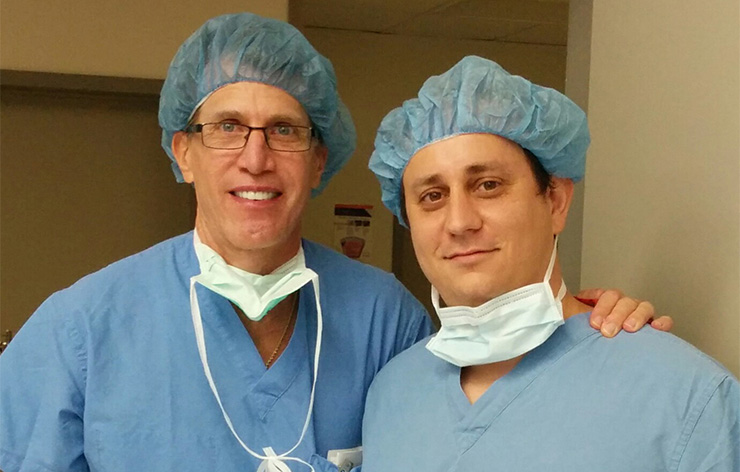A Word From Our Latest Rabin Medical Exchange Visiting Fellow: Dr. Shai Shemesh

Dr. Shemesh adn Dr. Swanson Las Vegas 2014
Dr. Shemesh and AFRMC would like to thank Dr. Hugh Bassewitz for hosting Dr. Shemesh at the Desert Orthopaedic Center in Las Vegas and for arranging the annual - for five years straight - visiting Rabin Fellow at his Center. Special thanks to Elliot Karp, President & CEO of Jewish Federation of Las Vegas for spearheading this annual Fellowship and granting full support to make this visiting Rabin Fellow an annual reality.
Here is what our Rabin Fellow, Dr. Shemesh had to say:
- Please provide an overview of your fellowship at your hospital and the role you played during your stay.
During my fellowship at the Las-Vegas Orthopedic Desert Center, I have spent two weeks with Dr. Todd Swanson and Dr. Parminder Kang, both well-known high-volume surgeons practicing the field of Arthroplasty (Adult reconstruction). The fellowship included operating room time, as well as active participation in the assessment, examination and treatment of patients.
- Describe how your fellowship opportunity has expanded your knowledge in your specific field.
The fellowship included a great deal of exposure to hip and knee arthroplasty, revision hip and knee arthroplasty, arthroscopy of the hip joint, and other adult reconstructive surgical procedures. I have gained experience in the most up-to-date techniques in joint arthroplasty and revision of joint arthroplasty.
- What did you enjoy most about your fellowship opportunity?
I mostly enjoyed the dedicated time in the operating room, where I was exposed to surgical techniques that were new to me. I also enjoyed the chance to interview and examine patients, and to further discuss the treatment goals and options with the surgeons.
- What were some of the challenges you faced while working at your hospital?
As residents in a busy orthopedic surgery department at the Rabin Medical Center, we provide medical care to a large population in the center of Israel, including a large number of trauma patients. My biggest challenge is, therefore, to provide care of the highest quality to my patients, in spite of the high workload, and at the same time to focus on my training and personal development as a surgeon.
- Do you feel international medical relationships and fellowship programs are vital to the future of medicine and research?
I definitely feel that training in the form of clinical fellowships is crucial to the future of medicine. As international medical graduates, these opportunities allow us to take our experience and knowledge to the next level. This fellowship was a unique opportunity to increase the breadth and depth of my ability to deal with complex adult reconstruction issues and to refine my surgical skills.
- Explain the major differences between the Israeli health care system and the United States private healthcare systems in terms of your specific field.
The Israeli healthcare system is a taxpayer-financed system, providing care to a basic set of services for all. Health care in the United States, on the other hand, is largely owned and operated by private sector organizations and businesses, and therefore is more advanced and high-tech. In my specific field, the US health system sets the standards in patient care, and has a significant role in spreading medical knowledge worldwide.
- What do you feel are the key issues and challenges in your field – not only in the Unites States and Israel, but worldwide?
The key challenges in the field of Orthopedic surgery, and especially in adult reconstruction (Hip and Knee replacements) are: Improving the current techniques for joint replacements, diminishing complications and lowering infection rates, and increasing the longevity of our implants.
- What are your future plans at Rabin Medical Center when you return to Israel?
My first goal is to successfully complete my residency at the Rabin Medical Center and become a well-rounded orthopedic surgeon. The next step is a long term fellowship in my field. My long-term goal is to become a surgeon-scientist contributing both to the clinical practice of orthopedics and the biologic understanding of musculoskeletal medicine
- Would you recommend this fellowship to your peers? Why or why not?
I would definitely recommend this fellowship to my friends and colleagues, especially those who intend to pursue a longer fellowship program in the United States. Spending time with world-class surgeons contributes to our knowledge and our ability to deal with complex cases and surgical challenges. Except for increasing our knowledge and experience, this unique opportunity allows the fellows familiarize themselves with the US healthcare environment.
SPECIAL THANK YOU TO THE AMERICAN FRIENDS OF RABIN MEDICAL CENTER AND SUPPORTERS OF THE RABIN MEDICAL EXCHANGE FELLOWSHIP PROGRAM. PLEASE SUPPORT THE RABIN FELLOW PROGRAM TODAY TO CONTINUE THIS ONCE IN A LIFETIME OPPORTUNITY FOR FUTURE RABIN MEDICAL EXCHANGE FELLOWS! YOU CAN SPONSOR A RABIN FELLOW FOR $5,000!
Related Articles
First Israeli-Arab Rabin Medical Exchange Fellow Speaks at Afrmc Global Connections
Dr. Mohamed Kittani is the first Israeli-Arab doctor to join the prestigious Rabin Medical Exchange fellowship program.
An Unforgettable Learning Experience: Dr. Orly Gal Or
I spent a month doing observership and training under the guidance of Dr. Lawrence Vannuzzi at Vitreous Retina Macula Consultants of New York (VRMNY) clinic. VRMNY is considered one of the top international ophthalmological retinal imaging centers and it houses the most respected physicians and researchers in the sub-field of retina and imaging.
An Unforgettable Learning Experience: Dr. Orvin Katia
I spent one month (April 2015) at the Columbia University Medical Center – in the Cardiology Critical Care Unit (CCU). I worked under the supervision of Dr. LeRoy Rabbani. I joined the CCU team as an observer, but I participated in all of their activities during the day.